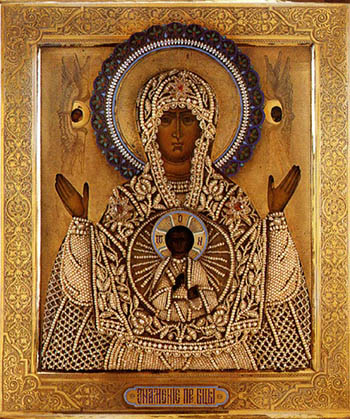
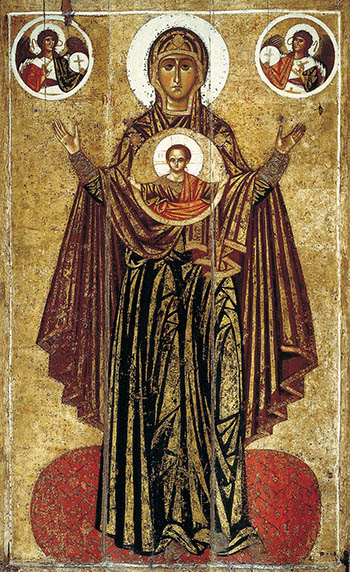
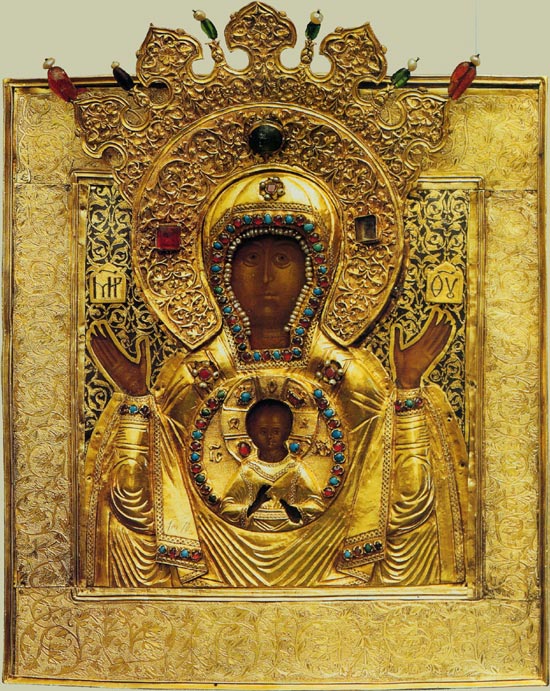
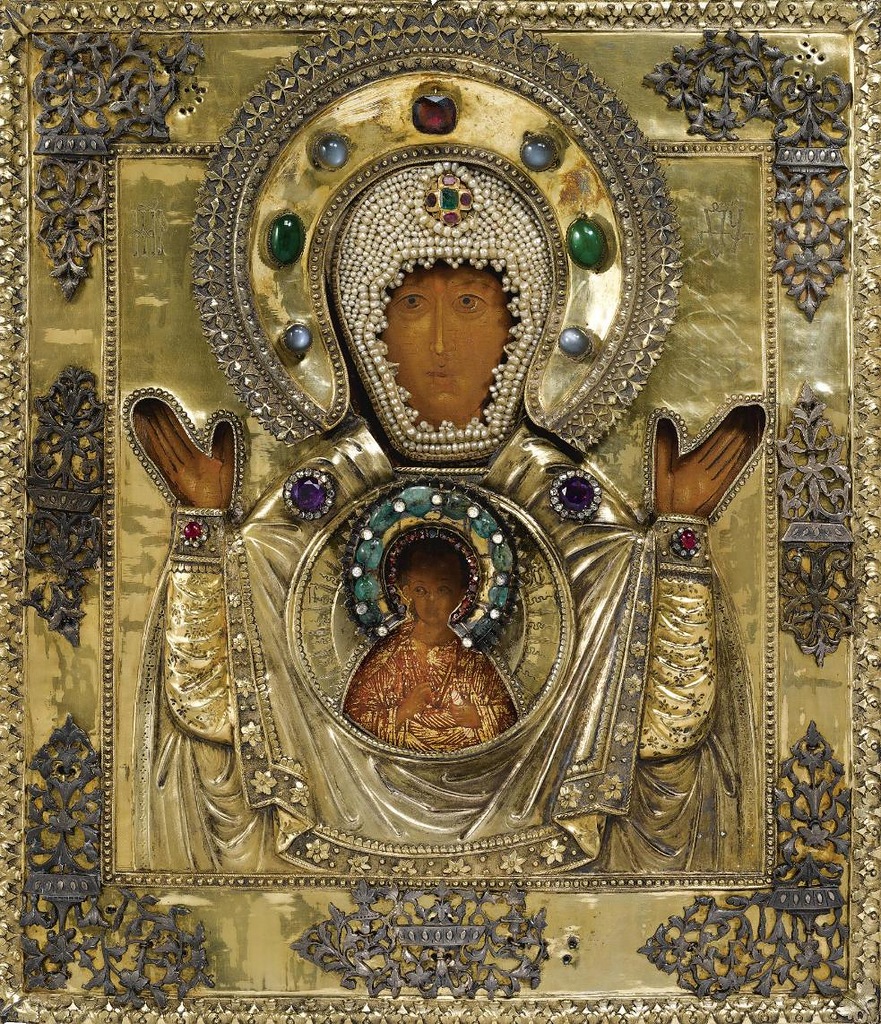
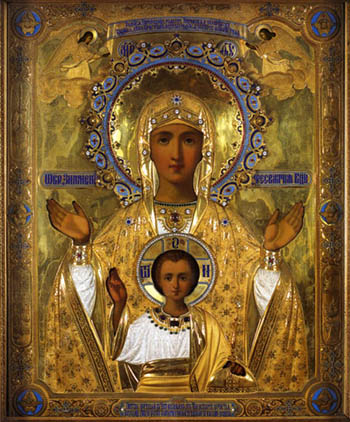
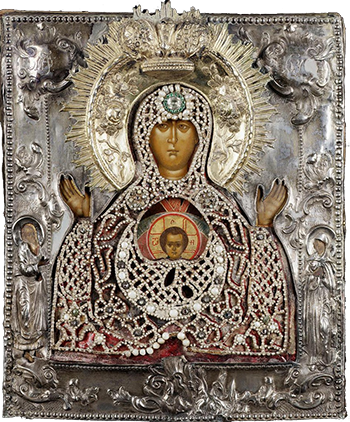

Discourse on the Miracle that Occurred in the Blachernae by Michael Psellos
The following was originally published here. The author is Elizabeth A. Fisher.
Commentary - I have only republished the section dealing with the miracle in Blachernae
Psellos’ oration on the miracle at Blachernae is a command performance requested by the Emperor Michael VII Doukas in the summer of 1075. Psellos examines a recent legal case at some length and in some detail, dividing his narrative of events into two separate episodes so that he may explore the philosophical and legal questions raised by particular aspects of the court system and of the final court decision. By combining the two episodes, we may reconstruct much of this remarkable case.
As a prologue to his narrative, Psellos describes an inexplicable phenomenon that regularly occurred at the Church of the Blachernae in Constantinople, where a lavishly decorated curtain hung in front of an ancient icon depicting the Virgin. Every Friday at sunset the church was cleared of all clergy and lay people, who waited in the courtyard while certain unspecified rituals were performed. At the conclusion of these rituals, the doors reopened, and the crowd reentered to observe the miraculous lifting of the curtain in front of the icon. Those present witnessed the form of the Virgin change and appear animate or “ensouled,” as Psellos says, establishing the real presence of the blessed Virgin at the moment of her miracle. Forestalling skeptical protests that some unknown natural process was the mechanical cause of the phenomenon, Psellos observes that the miracle was unlike a regular and predictable natural event such as an eclipse because the miracle occurred usually and predictably on Friday—but occasionally and unpredictably, it might cease.
5.1 The court that was constituted [at Blachernae] was not a civil [institution] for investigating matters of civil law, but the place of judgment that resulted from the action of the virginal Mother of God was a mystical and ineffable [institution] for [solving] the problem set before her; the decision it rendered was not human, but the discernment it reached was mystical, not a verdict and sentence pronounced by the lips of judges, but a decision and a solution rendered from supernatural signs. She bore her child in an entirely new way (let me say it boldly!) and gave birth to the Word without the presence of man or of pain; it was proper that she also rendered the decree entrusted to her in an entirely new way, decided an ambiguous situation in a quite divine manner, and placed the matter in controversy beyond dispute. The narratives of the poets transport Justice from earth to the heavens and seat [her] in the councils of heaven to prevent all our lives from being deprived of justice and filled with lawlessness. The discourses [belonging to] truth, however, state that the Mother of God descended among us from the very vault of heaven to correct and to better our [earthly] situation or, to put it more correctly, the divine and blessed nature of the Mother of God did not forsake the role allotted to her in heaven and also did not forget the nature she shares [with us]. But just as the Word born in his essence from her came down to earth without forsaking the thrones of his Father [in heaven], and by putting on the whole [nature of] man he imparted salvation to the whole of human nature, in the same way she too imitates her Son to the extent possible and is both completely [in heaven] above and descends completely to us. Because she is united to his nature that cannot be circumscribed in a unity that is transcendent and incomprehensible, she herself necessarily surpasses incomparably the nearness to the divine [enjoyed by] the cherubim and also cannot be circumscribed; in every place she is infinite in both her noetic operations and capacities.
5.2. Her paradoxical [manifestations] occur in great number and in every place; some are apprehensible by the senses and others by the mind, some in physical symbols and others in ineffable thoughts. [They occur] in all cities, among all peoples, in each and every [one], both collectively and singly. For sometimes she descends to us in visions, and sometimes she acts unseen among us, revealing in signs beyond description what cannot be apprehended by the senses. She fills all earth’s boundaries with her own kind favors whenever it is opportune. By no means secondary [in importance] among her great miracles is also the manifestation that now [occurs] paradoxically, which [my] discourse will explain very clearly in due course. As for her identity as guardian and female savior of our people, although no one knows how this is so and what sort of place she now occupies (nor will anyone of us here on earth ever understand, unless some soul transcends all earthly matters and assumes a place and capacity beyond that of the cherubim), nevertheless those of us who express devotion to her in foreshadowings, images, and icons, even in likenesses, one might say, that are unlike [her], we envision her inimitable nature that cannot be replicated. For we are indeed able on occasion to see the sun clearly and glance directly [at it] or, if we have poor eyesight, we observe it [reflected] in water or see the air illuminated [by it], and we judge from such evidence that we see [the sun itself] in some sense. In contrast, no one would see the virgin Mother of God in any place, not in the sky nor in the air, not by looking up nor by gazing upon the basic elements [here] below, but the entities [of nature] everywhere present do not know her, although she is everywhere. When we portray [her] and produce likenesses [of her], we apprehend her as revealed by those likenesses, and especially if we make some such [replica] not by [using] colors but by longing [for her] with inexpressible [fervor] and by [entering into] a close relationship with her through virtues. No one could know the celestial paradigms themselves from the stars modeled upon them unless he could derive some small understanding of archetypes from their likenesses. When we depict the Virgin we simultaneously place our heartfelt emotions in the painting, and we then perceive her outward appearance with our eyes inasmuch as such things can be perceived, while in our souls we receive her imprint through this experience. Thus we grow into an inexpressibly close relationship with her, and she feels an [even] more ineffable sympathetic affection towards humankind. To put it boldly, God has approached and withdrawn in proportion to the purification of our souls and, in turn, in proportion to our disfigurement by the passions; we are like a mirror of the radiance from God, lustrous when we receive it and dull when deprived of it. However, the compassionate nature of the Mother of God, supernatural in her love for mankind, is reflected in all alike, both in those whose souls shine brightly and in those whose minds are still [dull and] muddy. A person could see her with his own eyes insofar as it would be possible to see—not only [someone] among those greatest and loftiest in excellence, but even some simple, insignificant woman who attends upon the Virgin’s icon from the back [of the crowd] and mumbles her hymn incorrectly. [The Virgin] welcomes with approval the most excellent form not of words and phrases but of souls; she finds a close relationship [with us] not in the way one arranges words but in the way one harmoniously conducts oneself.
5.3. Her precincts are many throughout [Constantinople], the Queen of Cities, and all are filled with her divine voice; both those [in] priestly orders and those assigned to these [precincts] speak under her inspiration. In some of these she is portrayed high up in the sanctuary, painted among the angelic powers that guard her, while in others she is represented upon the walls, so those who enter can draw near to [her] and be filled with the glory shining from the [walls]. In some places she is represented on materials that are fundamentally different; on occasion some place her likeness on gold, while some engrave silver. In some places a wooden panel contains a representation of her; she does not reject [Aristotle’s] proximate matter as unworthy. To make a comparison, the Son of [the Virgin] is believed to dwell in every place, and rather above or even beyond everything, that is, in heaven, according to a great number of excellent [sources]; at any rate, we choose to call for his help by immediately raising our hands up to heaven, not because we wish to confine him to that place, but as if to set apart a place that is better for one who is better and to set him apart from the material [world]. In the same way, also the one who bore him is present in a supernatural way and is manifested in each of her divine shrines but is especially acknowledged to dwell at the renowned church in Blachernae, [where] she clearly demonstrates divine signals. Her visitations cannot be circumscribed, however, for some [of these signals are manifested] not at any set time and others within prescribed periods that she does not customarily transgress, unless some inexplicable reason causes her miracle to halt after long periods of time. The [wondrous] miracle and its performance exceed even our capacity to wonder at [them]. And now, to avoid being the sort of person who offers excessive elaborations upon something so well known, I will make a brief comment about this [matter] and cut short the great amount [I could say] about her divine nature.
5.4. Her icon hangs nicely fitted on the right of the church as one enters facing east. [It is] inimitable in form, incomparable in beauty, unrivalled in potency. A veil of intricately woven [fabric] hangs from the icon, and a cluster of images composed of precious materials encircles the [veil]. The area near her is another sanctuary, where all the [things] prescribed for celebrants and celebrations are reverently dedicated to her — all sorts of hymns, prayers of propitiation, offerings appropriate to a sacred place. The ritual celebrated here on the sixth day of the week (i.e. on Friday) after sunset is extraordinary. At that time, everyone leaves the church, not just the crowd of lay people but also any priests and celebrants, and of these not only the ones who are circulating through “the worldly sanctuary” but even any who could pass inside the veil [of the sanctuary] and offer the ineffable [occult] sacrament. What [happens] next? All the entrance gates of the precinct are fastened shut while the crowd stands in the forecourt of the church near the outer entrance. When the officiating priests have completed the regular rituals, it is customary for God’s palace to be opened straightaway. Once it is opened, entrance is granted to those standing in front of the church. They enter with commingled fear and joy, while the drapery surrounding the icon lifts all of a sudden, as if some breath of air gently moved it. What happens is unbelievable to those who do not witness it, but for those who do, [it is] wondrous and an overt descent of the Holy Spirit. The form of the handmaiden of the Lord changes simultaneously with what is accomplished, I think, as it receives her animate visitation, thereby visibly signaling the invisible. In fact, the veil of the Temple was torn for her Son and God when he was hanging upon the cross so that he might either manifest the truth concealed in the marks impressed [by his presence] or summon believers into the inner sanctums and destroy the barrier preventing us from a close relationship with God. In contrast, the holy drapery raises itself for the Mother of God in an ineffable fashion so that she may embrace within herself the crowd that enters as if within some new inner sanctum and refuge that cannot be violated.
5.5. The appropriate time for this miracle has been determined, as I have said. At some point, however, the event halts, and in her case it is like a darkening of the sun, whenever it draws to a halt in the celestial latitudes near one of the ecliptic conjunctions, and the bulk of the moon passes in front of it, blocking the radiance [the sun] sends upon us. Nevertheless, those who are quite learned in the skill of astronomy understand the cause of such a so-called eclipse, and one could cite this as an account of the position [of the sun and the moon]. In contrast, no one would dare cite a [natural] cause for the miracle of the Mother of God “eclipsing.” I think that the halting of the miracle is designed to prevent anyone from lighting upon physical causes for what is accomplished. The “eclipse” of the prodigy exists rather as a more exact confirmation of the paradoxical and supernatural [nature of the] event. So the miracle is; it exists like day and night that arrive and depart in succession, and its manner [of occurrence] is as my oration has stated.
5.6. Based on [that miracle] a yet more wondrous [event] occurred. It originated in [the usual miracle], but by its untimely occurrence it manifested a miracle in an [even] more timely way. Whatever was it, then? In general for people, and especially for those in the countryside and in villages, it is highly desirable if one of them can have an extremely abundant [supply of] running water and a mill capable of grinding by [waterpower], so that grain may be easily and conveniently milled at this [mill]. Indeed many have disputed with their rural neighbors over both [water and mill], contending with one another; the courts are filled with dispute[s] about these [matters]. Two parties were caught up in such a controversy not long ago, [specifically] the spatharios and general Leo, surnamed Mandalos, and the party [representing] the monastery Tou Kalliou. Now the mill was located in the district of Thrace and powered by an abundant water [supply]; each of the two parties registered themselves as indisputable owner of the [rights] awarded now to one, now to the other. They had disputed the [particulars] of the case many times. Each party in turn prevailed and suffered defeat, became victor or vanquished, sometimes according to the documents they presented, sometimes pursuing their own claims in a quite persuasive manner and sometimes, you can be sure, taking in exchange [rights of] ownership and usage with a hand able to give lesser or greater [benefits] in each situation and for every judge.
5.7. After [coming before] a long succession of judges, the case even reached the dishypatos Gabriel Tzirithon, who was at that time responsible for legal decisions in the district of Thrace. Both he as well as those involved in the ensuing judgment know better [than I] whatever judgment the presiding judge gave. At the conclusion [of the hearing], the general lost the case by half, for the decision to distribute [rights to the property] was such as to deprive [each party] equally of ownership and of complete loss. For both parties became half owners, as one might say, of the [object of their] contest, themselves contesting legitimate ownership — the general because of what he did not possess but hoped to possess, the party of Tou Kalliou because of what they possessed and thought they would lose. For [they thought] that the general would not remain silent, wronged in every respect, as he saw it, and robbed regarding his property, because the judicial decision in the [matter] in question, I mean, was half in favor of the monastery.
5.8. Thereupon [the general] refused to accept the verdict but resumed his earlier [wrestler’s] grip, as they say. He expressed contempt for the judge’s memorandum of the proceedings as half-favorable to the monks and not completely and fully penalizing them. Multiple assertions on multiple occasions were then made in turn by both [parties], and the details of the judgment were under discussion for some time, but there was not yet agreement on [another] court by those who were still quarrelling after the judge delivered his decision. Both parties, however, eventually came together in a compact against all expectations and constituted a special court for themselves that originated from civil laws but in their case did not take its final form based on civil laws. For they did not set up for themselves a court in which they reached mutual agreement upon someone among the judges—a mid-level judge, or a special judge, or one having some other qualifications, since this is the law, and also [it is the law] not to put full confidence in the [judge’s] sentences, if he should be a special [judge]. Instead [the two parties] made the Mother of God the arbitrator in the case. How? They did not fly up to heaven, for [this] is not possible, nor did they bring her down here [to earth], for this is also outside the realm of possibility, but they staked everything upon the decision of the icon’s miracle. They undertook a bold initiative that was also contrary to the normal timing of the divine sign, and they each chose a scenario for their own side —whether in a just manner or by the monks’ design, I do not know—but they made their choice in this way: that each party would stand together at daybreak in the presence of the icon of her who bore God while holding in their hands the legal documents upon which they were relying for the strength [of their case] and [with which] they were both making storms [of controversy] for one another concerning these [matters]; that they would make this a kind of court that was innovative and reflected the judgment of God, then summon the Virgin in the icon and cry out plaintively [for her] to judge their case with justice and to make a decision by means of the drapery; that if it remained unmoved, the monks would claim victory in the case, but if it was moved, the general would claim the [spoils] of victory and bind [upon his head] another crown [won] against his foes [and] greater than a general’s trophy. After this decision was agreed upon, copies were also made of the written documents regarding the provisions of their agreement, such as is customary in the case of special judges.
5.9. When everything was completed—the entrance into the church, the attendance at the icon, the prayer, the tears, and whatever people usually do in such [circumstances] —they stood still because they [both] feared for their own side and considered valid the [Virgin’s] decision [that would be expressed] by the drapery’s movement or failure to move.
5.10. As the time for the sentence they awaited slipped by, the drapery remained yet unmoved. This seemed [to represent] a judgment and decisive point. The monks began to boast about their victory and at that point the general lost his case, as if he had received a black pebble regarding culpability in military matters. The other party was applauding, making a din like castanets with their hands, so to speak, and cackling aloud, while the general stood scowling with eyes fixed upon the floor because he had lost his case by a decision that was divine. He then yielded to the monks in the matter they had long disputed and surrendered to them the documents favoring his claim by placing these in [the monks’] hands.
5.11. What then was your role in these [matters], you who paid heed to the good news of [the angel] Gabriel, you who conceived the Logos beyond all logic, you who loaned to God flesh from yourself? I hope to avoid conviction on charges of blasphemy [when I ask] if you did not know the means of determining the verdict more exactly? Or did you know, but delay revealing your verdict? Or did you not delay [your verdict], but reveal it in a way different from the customary one, but with ambiguity, with obscurity, as if by a lapse of attention? No, none of the above! When, however, the general counted out and gave over to the monks the documents favoring his claim as if they were owed like a debt, you immediately raised the fabric dressing your icon, lifted it on high by its cords, and made it rest in midair so that the decisive point would be completely clear. The result was a reversal of emotions [by the two parties]; the ones laughing suddenly scowled and the one wearing a scowl suddenly relaxed with relief, freed [of anxiety] and [his heart] filled with contentment and delight. Even if the monastic party seemed to behave somewhat shamelessly and shamelessly asserted that the sentence came after the time [agreed upon], nevertheless they eventually acknowledged their defeat and conceded victory to the general.
5.12. Some of those who opposed [the verdict] interpreted the sign in favor of their cause and regarded the movement [of the drapery] as a ratification and confirmation of the judgment for themselves because the drapery did not move quickly nor did the symbol of its divine possession occur simultaneously with the [general’s] prayer, but [rather] when the general gave over the written judgments in the matter under dispute. This [objection] is insufficient to require a counter argument. For the [two] adversaries did not make an agreement that the movement of the drapery should occur immediately or after a [definite] time. Instead, the general obtained as his lot in the litigation the movement [of the drapery], while the monks assigned to themselves that the drapery remain motionless. Now if at the time [the drapery] had remained still during the whole [process], and the contending parties had parted from one another after already leaving the church, and a considerable length of time had elapsed after that, and then the symbol[ic movement] occurred on the same day or later, [the monks’] right of possession would not be in dispute. For the Virgin who was giving the verdict was allowed to determine the proper time for her to announce it, since not even a civil judge would make a decision and announce it immediately, but after determining his decision he delays his sentence until whatever proper time he might wish. Since she decided to delay the movement for a short time, and those who were contending with one another as parties in the case were still standing in the holy precinct, and the divine decree coincided with the [general’s] distribution of his documents, and the Virgin in making her decision announced her verdict in a quite innovative manner, what reason is there to oppose it? For they had not associated penalties with the timing of the symbol [ic movement], but the Virgin knew the right time for the [drapery to] move.
5.13. “Yes indeed,” say [the monks], “but the [drapery] moved after the surrender of the documents, witnessing as it were to the justice of the surrender.” Someone, even someone just chancing upon [the monks], might say, “But the movement [of the drapery] fell to the lot of the general, and to you its lack of movement. If then it remained still during the entire time, yours [was] the victory. But if it moved, this [victory] is assigned to the side of the general, and, just as you would have won if no movement had occurred, so he has prevailed because it did.” I, however, say the movement of the drapery was not simply an announcement of a verdict, but [an expression] of outright wrath. For the [icon’s] garment was shaken at the very moment when you dared to take the documents. Because of what you quite shamelessly did, the Virgin moved [the drapery], and the symbolic movement represents at once both a sentence favoring the general and a sign of anger against those who already behaved so shamelessly. In this way God is accustomed to sit in judgment and to bring forward His condemnations, not whenever one might wish to transgress, but whenever one might commit or be about to commit the transgression. To Him whom the [divine] mother imitates in loving mankind she likens herself exactly in punishing [mankind]. And the contrast [between love and punishment] is not at all forced, but the logic is both consistent and most true. Thus if someone should not accept the miraculous decree and should not regard what happened with awe but should worry excessively over the miracle, he would all the more be struck by what is opposite [to it]. Just as if someone with weak eyes should dare to stare at the sun where it stands at midday in the season of summer, he would not see [the sun] and would perhaps be deprived of the power of visual perception.
5.14. This [miracle] could bear no comparison with other [miracles], but seems to me more astonishing and more miraculous than the usual [miracle at Blachernae]. For that [usual miracle] is customary, and its exact time is known, and [it has] some sort of cycle that is, so to speak, fixed, like the rising of the sun. This however seems to be some sort of prodigy and an innovative action [occurring] now for the first time and a new manifestation of the Spirit and a visitation of the Mother of God that has newly appeared. For through all past history it has never happened in this way, neither based upon such agreements [between parties] nor regarding such decisions. However, even though the risings of the sun are also a paradox, of course it does not shake the very hearts of observers as entirely miraculous when regularly seen — but we are astonished upon hearing [the story of] when “the sun” stood “over against Gabaon and the moon over against the valley [of Aelon]” after “Joshua son of Naue” received from God leadership of the people of Israel. We consider what happened at the cross of the Lord yet more miraculous than this, when midday stood still, and the sun held the very cardinal point of its zenith, and the moon was in the fourteenth day [of its cycle] and at its nadir and then canceled its [normal] courses to appear above the horizon and darken the sun by slipping in front of it. (I omit mentioning also the prodigy concerning Hezekiah, when the sun traveled backward so that he might be assured that years would be added [to his life].) Accordingly, in this case surely a single [occurrence of the miracle] at an unexpected time is more astonishing than its frequent [manifestations] in a defined manner. Who could know if this might be a pattern for future innovations, and, should human courts come to a standstill after encountering disputed matters and failing repeatedly in their purpose, the Virgin would also decide complex investigations by easily managing [judicial] inquiries as well as announcements of verdicts. Thus would our life be without disputes, and a person would be least likely to devote himself to intentional wrongdoing if he faces immediate conviction by divine symbols.
5.15. As for the oracular responses of the ancient Greeks—however many [there might be] at Dodona and at Pythian [Delphi], however many [might] otherwise enjoy a good reputation, and as many as Amphiareus and Amphilochos would deliver in a shrine hidden in the earth—[these] are riddling, oblique, and ambiguous. In addition, “the wooden wall” was contested [regarding its meaning] and “the great empire which Croesus would destroy by crossing the Halys River” was highly disputed regarding its identity and interpreted in two ways. Also, Bacis and the Sibyl did not shoot forth arrow-straight prophecies relevant to the target set out [by the questioner], but their prophecies were dispatched consistent with probable inferences. In contrast, what I might call the oracle of the Virgin dispatches no double meaning as learned persons might do in the problems they formulate nor does [her oracle] contradict itself with riddles, but [she gives her response] in accordance with the agreement someone might choose regarding the movement or lack of movement of the drapery, that is whether it should move immediately or remain in an unmoved state. In Plato’s opinion, the priestesses and prophetesses in their frenzied madness were of greater potency than if they had chosen prudent restraint, and he reiterates this frequently in his dialogue with Gorgias. I however would be half-mad if I considered madness better and superior to prudent restraint, and I would also feel shame if I should ascribe prudent restraint to the Mother of God—if indeed prudent restraint is composure of the soul when the passions have been subdued by her, just as self-control is [composure] of the intellect when it represses the impulses of the soul towards inferiority — in contrast, the Virgin [is] superior to all prudent restraint in surpassing the very summits of the virtues. However, if there should be some oracular sites that are fit for God and of heavenly origin, where the more worthy [supernatural] powers foretell the outcome of events to come and from which and where signs of the future are indicated, the Virgin would possess the best and most truthful [of such oracular sites], from which her earthly altars are also filled with streams of quite divine illumination.
5.16. The ancient Greeks pursued empty and frivolous ends by resorting to their particular kinds of oracles and by preparing telestic rites for them that invested certain statues with divine frenzy so they could respond to inquiries. For either the rite they [celebrated] was only half effective and the oracular site of no effect, or the presiding spirit was quite closely attached to the material world and wandered in the realm of things that will happen in the future. Moreover the whirling motion of Hecate’s [wheel accomplished] by her ox hide thong and [accompanied by] the invocation of the Iynxes are all mere empty words without any effect; even if they should effect something, it [would be] by the action of a malevolent spirit. If however in the opinion of these [ancient Greeks] the more pleasing animals [like] doves and pigeons are filled with divine inspiration, and [if] some bird settles and signals to them by its voice, appearance, or movement what is going to happen, how could the Mother of God not foretell the entire truth to us, especially if a person should fix his hopes upon her and attribute [to her] the decisive point regarding a practical matter as was done in the law case already mentioned. Forget about the daemon of Socrates, then, that prevented [action on the part of] the person it possessed but never promoted [it]. Whatever might this [daemon] be? Was it some echo that cast back [what a person already intended to do]? Or was it some apparition? According to the [system] of [occult] interpretation that we cannot mention, [this] would be the daemon that is assigned to him and watches nearby, which Plato calls the pilot of the mind. The prearranged sign that the Mother of God [used] to promote action is an oracle that is unerring, true, and in existence according to a new way. The statues or rather the idols of the ancient Greeks played games for Chrysanthius and Maximus in the [temple] of Hecate, and the signals they manifested were foreboding; [Maximus], the more daring of the [two] philosophers, attempted in vain to change [the intention of] that which includes everything within its boundaries so as to come close to more favorable appearances [of the omens]. However, among us [Christians] the symbols of the Mother of God are true, and no one would devote attention to changing their appearances or, if he did [try], he would never be able [to do it].
5.17. However, I would be ashamed to compare the nonsense of the ancient Greeks with [oracular matters] that both belong to us and are [much] superior. Did not the shadow of the law have some more forceful overshadowings [of the divine presence]? For there was the oracle of judgment, and stones named “Manifestations” and “Truth,” and the garment worn on the breast called in the Hebrew language Ephod, where these [stones] were inset, indeed, the Propitiatory fitted upon the Ark of the Covenant within the Holy of Holies regularly received flashes of revelation that were quite divine in origin, but even these are of lesser significance than the manifestations and overshadowings of the Mother of God. Those provided guidance that was obscure, and they changed into various colors, but the symbol that appeared was not entirely clear in every respect. Here [at the Blachernae Church], however, the movement [of the drapery] for the sake of the truth was a motion that could not be changed, and it was appropriate to the divine in its appearance as well as supernatural in the understanding [it conveyed]. Moreover, it would be a lengthy [task] to relate both how many [actual events] are indicated in [scriptural] figures and how many in truths [revealed by dreams and omens] among us, but especially how many the Mother of God indicates. The [colleagues] of Darius the Mede made their decision concerning kingship according to the whinnying of a horse, and the [companions] of Romulus [made their decision] in founding Rome according to the omens delivered by birds. In the one case, the horse belonging to Darius, son of Hytaspes, whinnied because of the clever contrivance of a groom. In the other case, vultures in support of Romulus flew overhead from the left accompanied by a great clamor; [the left is] the direction where the pole of the axis is elevated. However, in the case of the problem and judicial inquiry under discussion here, neither are birds trusted [to reveal] the truth nor a love-crazed horse [to determine] the leadership of the Persians. Indeed, in the vote of the Mother of God a balance between the arguments of each party both hangs [in suspension] and brings a solution with such brilliant clarity that not even those who lost the case can shamelessly refuse [to accept her decision].
5.18. The oracular responses provided by the daemons, then, took their impetus from configurations in the heavens, for in this way those who offer interpretations based on natural phenomena determine and confidently affirm [their pronouncements]. When a certain woman who was very close to giving birth asked Apollo whether she would bear a male or a female child, he replied that she would bear not a son but a daughter and cited the configuration of the stars:
“For keen-sighted Phoebe [the moon goddess] caused an act of conception through chaste Cyprian [Aphrodite] who promoted a female offspring.” For “from the [time of] conception,” the [child] to be born was marked [as female] “because the moon was approaching Aphrodite.” Again using this reasoning, the Pythian [oracle of Apollo at Delphi] explained the source of an appetite for war in a certain man by saying, “He has [the star of] rash Ares, [god of war], at his birth and [Ares] motivates him.”
5.19. In this way and from that [astrological] source the daemons give their oracles and proclaim future events to those who inquire. The Virgin, however, who has accepted the rudders of our lives and steers us from [heaven] above, watches over everything but never raises her eyes towards all the [astrological configurations]. She predicts future events because she is closely attached to God in immediate [bonds of] unity, and from that source she draws the truth and power of her pronouncements. Moreover, when our emperor reads of these [matters] in Holy Scripture, he both understands [them] clearly and acts to interpret and expound things that are quite ineffable to those who do not understand. If his keen nature should gain a spark [of inspiration] by trading [in ideas] with me, even so he would himself still graciously give me leave to speak, or I would myself [give] him the basis for his understanding [of an issue]. For this divine[ly inspired] man would take fire from the flames of my [intelligence] to a greater extent than I myself could ignite [him]. As a result, I assure you, he too became all but an eyewitness of the miracle that took place [in Blachernae] and instigated many lines of reasoning about the quite divine [events]; he both marveled at their fulfillment and elaborated upon it in discourses that he did not write down. He then encouraged me [to provide] a more complete explanation in reverent language, as if assigning to some Pericles the public speech that was significant. Now Pericles was pressed to compose his speech for the virgin [goddess Athena] three days before delivering it in public, while I pronounced mine by improvising it on the spot. If my inspiration derived from that source which moved the drapery of the Virgin, this [work of mine] was also from the Mother of God so that miracle might attach upon miracle, the miracle pertaining to my speech upon the miracle of the drapery.
5.20. I mentioned in my remarks right at the beginning of this oration that the investigation [of a disagreement] is [characteristic] of civil subject matter for the laws and the courts, but the means of achieving a just resolution [in the present case] is different, beyond everyday laws and in truth transcending them by means of the supernatural. For while a dispute over a civil matter and strife between contending parties over ownership or usufruct belongs to the everyday business of the courts, bringing an investigation to a judgment on the basis of a decisive point that even the law does not understand, while not contrary to the law, is above the law. If someone should wish to force the argument, he is able to say that there is a decisive point that is entirely legal. For in the law codes there are [chapter] titles on judges and on their jurisdictions as well as on coadjutors and on special judges; he chapters about these are as follows:
5.20. I mentioned in my remarks right at the beginning of this oration that the investigation [of a disagreement] is [characteristic] of civil subject matter for the laws and the courts, but the means of achieving a just resolution [in the present case] is different, beyond everyday laws and in truth transcending them by means of the supernatural. For while a dispute over a civil matter and strife between contending parties over ownership or usufruct belongs to the everyday business of the courts, bringing an investigation to a judgment on the basis of a decisive point that even the law does not understand, while not contrary to the law, is above the law. If someone should wish to force the argument, he is able to say that there is a decisive point that is entirely legal. For in the law codes there are [chapter] titles on judges and on their jurisdictions as well as on coadjutors and on special judges; he chapters about these are as follows:
“The special court is like a” competent “court and its [powers] extend to reaching judgments [in a case]” (Basilika 7.2.1), and further, “A special judge is one who has received an assignment as judge” (Basilika 7.2.13.2 line 7), and again “Whether just or unjust, the sentence of the special [judge] must stand” (Basilika 7.2.27.2) and yet more surprising, that “Even should” someone serving anywhere at all in the capacity of a special judge “be mistaken in casting his vote, he does not correct it; for once he has cast his vote, he ceases to be a judge” (Basilika 7.2.20 lines 1–2); Other such chapters [also] fall under the title on special judges. The copies of written documents from both parties clearly indicate that the opposing [parties] in the presence of the One who Bore God chose to have [her] participate in the trial as a special judge, so to speak; the difference in comparison to the special judge as customarily designated under the law [is] that the [law] appoints a man connected with the court or a private person who has been selected as judge by the parties in the trial, [84] while the general and the monks of the monastery Tou Kalliou did not make an appeal to such a [judge], but to the Mother of God alone. They did not conceive of the decision as [derived] from arguments and laws nor as an oral or written sentence, but they considered that the decisive point and announcement of a verdict in the inquiry would be [something] capable of going either way, [namely] a symbolic movement or lack of movement [by the drapery]. [Thus] a sort of hybrid court exists, partly civil and partly from a higher sphere.
5.21. I would make my decision in the matter as follows. [Let us suppose that] the parties in a dispute made a mockery of reasonable arguments and entrusted the decisive point in an ambiguous [case] to some outrageous activity, [such as] to a game of backgammon or the roll of the dice, to birds’ flight, their cries, their [manner of] alighting, the number of their movements, or to something else of that sort, [or] to [the outcome of] footraces or wrestling matches of certain [athletes]. Alternatively, [suppose they say that] if someone should throw a discus up beyond the clouds and [someone else] should hurl it as far as six miles, one side will win, the other will lose. If, [as I said] these [opposing parties] were to decide together upon a mutually agreeable means of judging in this way and [if] this was to be the special [court constituted] according to their agreement, I myself would not choose their court nor would I count the choice that settled upon these [criteria] as comparable to the agreements that were determined concerning the special judges. Since the one [choice] is something that is superior to that determined according to laws and the other is inferior, I dismiss the one, inasmuch as it is inferior, into [the category of] illegal [actions] but the other, inasmuch as it is superior, I pronounce both legal and superior to the law. [It is] legal because the prearranged signal based on a legally observed phenomenon has been acknowledged by both sides, while [it is] superior to the law because [the two parties] have brought [the case] to its conclusion on the basis of a perception mystically [obtained]. For it is not as if one [choice] is deficient and the other excessive, while justice lies as a mean between them, as in the case of someone taking too little or too much, so that the two extremes must be faulted and the median praised, but just as immaterial light is more luminous than material [light] and preferable to it, while darkness is something entirely opposed [to light], so [in the case] of the special judge, one [choice] is led to an inferior decision that is most strange and contrary to law, as my oration has determined, while the other leads to a superior [decision] that is at once most marvelous and most in compliance with law. If a subordinate [judge] who becomes a special [judge] also confidently passes judgment according to the laws, or even contrary to them on many occasions, would the [Virgin] appear inferior in this case, when she both judged the party in the lawsuit who represented her own place and condemned [them], just because she resolved the inquiry by means of a novel symbolic [action] that was agreed upon by the contending parties? Far from it! If someone does not understand what has happened and how he would form a judgment [about it] in his bewilderment, will this [miraculous event] be insufficient to function as a decisive point? In no way! Why would someone in present or in future generations even dare to convene a court of appeal for the events that have taken place or, because [a special court] might not conform in every respect to the civil law, [why would someone dare] to nullify as contrary to law that which is better and more noble than this [law] or [dare to] refer the decision to [the pagan court of ] the Areopagus? If someone should then opt for a decisive point that is supernatural, he has what he wants here as a shining [example]; if instead he should prefer a sentence under the law, this [example] has both started from the law and the alteration [that resulted] is superior to the law. Now, someone has taken an oath by God, because the law prescribes it or because a judge requires it; there are cases in which he did not obtain a sentence that prevails in a final sense. The law says, when good cause is established and new documents have been discovered, even the oath sworn before the court can be examined in a new trial. Moreover, although every other court’s sentence is subject to appeal, as for the decision of the Mother of God, [rendered] in symbols when the parties in the suit so agreed, it will not be cancelled on the basis of new documents nor referred on appeal. Why? Because there are occasions when civil judges, even if they should reach the pinnacle of legal learning, make errors in their determination, and the one who swears his oath often scorns the Almighty on a selfish impulse and in hope of personal gain. But who in the world would fault the Mother of God when she renders a judgment and discovers the truth, revealing it in a new way? [Who] would dare provide a different verdict?
5.22. But if someone should not be altogether able to refer to a law the procedure undertaken in this situation, [it would be] nothing new, since one would not even move the condictio ex lege with reference to an action limited [to a particular law]. “For this [condictio ex lege] is applicable when legislation introduces a new [sort of] liability and claim without expressly stating by what action it is to be moved.” However, this [citation] is understood as beside [our] main subject and argued as a parallel, while the procedure [in this case] is itself both conducted under law, if you will, and is brought to its conclusion beyond the law. On both counts, the one who obtains what he justly deserved from the all-holy [Virgin] will have a judgment that is beyond question. Now not in all actions is the role of plaintiff assigned solely to one of the opposing parties and the role of defendant to the other. Sometimes both parties have both roles, and the same [parties] are both plaintiffs and defendants, as in the so-called double trials, such as a case between joint heirs either under a will or without a will, which both is and is termed both in rem and in personam, (that is, applied to [claims of ] property and applied to [claims against] a person). [Another instance is] the [case] concerning land boundaries and so forth—but why should we rehearse everything? If the opposing parties should agree with one another regarding the right to speak first in the action, [that is, regarding] who first enters the court (for both could not be plaintiff with equal rights [to speak first]), and [if] they should assign this [role], to which they have a common right, by some symbol or in some other manner, and if someone should obtain this by lot, would he not himself be first to bring his accusation, even though this [role] is not assigned to him by law? Would it not be strange, then, if some chance occurrence should prevail regarding the right to speak first and the agreement by both parties should be counted as law, but in the present inquiry, which adopted a previously determined divine sign and praiseworthy compact, the agreement will have some other [status] in comparison to a chance event? For let “chance” be taken in the more common sense [of the word], even if among the philosophers chance and spontaneity, when enumerated among the causes, possess some distinction [from the others].
5.23. My earnest endeavor in my oration is this, [to establish] that neither did the opposing parties reach an outrageous agreement in resolving their inquiry according to the behavior of the Mother of God’s holy drapery nor does the miracle that took place prevail to any lesser degree than a judicial opinion and sentence. Those who lost the case moreover would have no basis for an objection. For in apportioning the sign, they did not assign to the general the symbol that would be his on fair terms, but to him they allotted what was unlikely or what most seldom [occurred], while to themselves they gave, as I might say, what has no value as a symbol. For the movement of the drapery is [characteristic] of a miracle, while its lack of movement is [characteristic] of its natural state, and the natural state is more [likely to occur] than a wondrous [event]. How then could they claim that the divine signal is not consistent with law? “But you,” someone might say to them, “when the prayer took place and the miracle had yet to occur, you had [already] congratulated yourselves as the winners on the basis of the present situation. How then did you lay claim to [victory in] the case with all your might when the miracle had not taken place, then later when [it] did take place, will you again on fair terms make the same claim? Nevertheless, you obviously lost the case both according to the compact you agreed to yourselves and according to the Virgin’s decisive point; a person would have his tongue entirely cut out if he opposed the miracle and reckoned the excess of his power [equivalent to] the deficiency of his own persuasive argumentation—as I will say, to avoid calling it “idle talk.”
5.24. The arguments in my oration have proven that if someone should not only choose to drag us down but should also force [us] from the more heavenly [point of view] into the more mundane one and compel [us] to struggle about the laws, in these [matters] we are not inferior to those who try to oppose us. I, however, shall return to the primary decisive point of my oration, and I both add miracle to miracle, and I would never willingly release my hold upon the wonders belonging to the Mother of God nor retreat from them. But who in the world would not marvel upon hearing of the sequence of miracles [occurring] in this way and the succession of supernatural symbols? The general prevailed in the contest both by virtue of the legal and of the miraculous, and the protoproedros John of the Xeros family, who received from the emperor the first position of the service in his ranking, awarded to [the general] the legal documents. Thus [the judgment] was awarded to him both by the authority of the Virgin and by the power of the emperor. Indeed, the general did not depart without paying proper respect to the Virgin from whom he had received a favorable judgment; with the documents he had been given in hand, he approaches the Mother of God, draws near to her icon, and throws himself to the ground in acknowledgment of her every favor. She then, who miraculously decided the case, [even] more miraculously seals anew her verdict. And [what was] the seal? Yet again the covering of her icon is raised, and the holy veil is lifted up; as in the case of the periodos and the kyklos, which start and end with the same [word], the matter she examined comes full circle so that it will be bonded together most securely by two miracles, each like the other.
5.25. My oration, like a runner that races up and doubles back in a quite new [kind of] race course, also now engages with divine [matters], then in turn with material substances observable to the senses, and chooses to discuss something yet more sublime and to investigate the possible cause of such divine signs. In fact, often prints of unseen feet or hands are fixed in the ground, and shapes of living beings become visible, like those belonging to the sacred meteors somewhere long ago and [like] scorched marks around stones; certain icons and statues stream with liquid as if perspiring, and movements without a perceptible cause become visible around such things. Also, certain sounds are heard, some from [thin] air, some from wells, some from other [sorts of] springs, and other, stranger things of this sort fall upon the senses. But the truest cause of these [phenomena] God in fact would know and anyone who approaches the nature of the divine; what we then have learned from the more esoteric branch of philosophy, if we could say [this] with modesty, will be sufficient for our audience. Let this first be agreed: some beings are precisely that, “truly beings,” both divine and supernatural, while others are inferior to them; their abasement descends even to sense perception and to matter itself, and their bodies here [on earth] receive certain reflections and disclosures of the superior things, for the inferior partake of the superior. Moreover, the divine is similar to itself and not at all subject to change, while everything under the moon is both composed of dissimilar elements and subject to change, and to the degree that the descent [of the divine] proceeds, the change makes its mark. The worse also receives its illuminations from the better, not in the way those [divine beings] possess [illumination] but in the way these [worse ones] are capable [of receiving it]. Divinity then is unmoved, but wherever illumination might advance from those [divine beings] to the [material] body, this [body] is moved, for it does not receive reflection and disclosure without being subject to change, nor can it. The creating force is also without form, while that which is susceptible to change receives some sort of form and transformation. Colors are also the symbols of things to come, for the whites [symbolize] the brilliance of future events, while the blacks [belong to] the obscure and indefinite, and the [colors] that are between these are worse to the degree they are darker, better to the degree they are lighter, and mixed at the midpoint; an example [is] grey, which participates equally in the extremes of [black and white]. The scorched marks indicate some more violent movement to come and the worst sort of reversal [in fortune]; mysterious handprints [are evidence] of the touch of a superior nature, but footprints, of a sudden movement in future events. Upon experiencing reflection and disclosure of the divine, air and water produce a [sound] discordant to its hearers because they would not be able to experience [the divine] without being subject to change. Also the poet says, “Loudly did the oaken axle creak,” not because the superior [nature], being subject to change, was “burdened” with matter, but because matter in its normal state received reflection and disclosure.
5.26. [I spoke of] these [matters] in a cursory fashion and in a spirited manner as a teacher of rhetoric would concerning inferior responses to questions being raised. However, this much must be said at this point regarding the evocation of God by souls: since we are composed of faculties that differ from one another—superior and inferior, loftier and more humble (I am speaking of intellect, of discursive thought, of imagination, and of the others ) — whenever the soul is inspired as a whole and the intellect is first to receive the illumination, the other [faculties] are set in motion as [the intellect’s] instrument, since they are restricted in the life that is theirs; this is why [the intellect] as it sees God is then also unaware of itself. If in contrast the [faculty of] discursive thought or the spirit of the imagination has been set in motion by evoking God, the intellect, which is placed above these [faculties] would recognize the divine movements and interpret them, without being subject to change.
5.27. Thanks [be] to the Mother of God, who has provided us through the miracle with resources to interpret inspiration [from] superior [things]. I indeed know that a dearth of wisdom existing in the portion of time allotted to me has made the souls of many [people] immovable and implacable in matters of the supernatural. However, just because many [people] remain unmoved regarding superior [things], we who love them passionately need not join these [people] in becoming like an [unthinking] tree or a stone and like [someone] living the life of a plant uprooted from the soil when we interpret these [superior matters] especially in a manner more spiritual but not Aristotelian, so that we gain from them understanding of what the words concerning the [Old Testament] prophets were and what sort of things the headings and the Selah in the Psalms are. For all these matters belong to the understanding of superior things. If we must set forth propositions and draw conclusions by means of [Aristotelian] syllogisms, we would collect axiomatic principles concerning each genus that are more divinely appropriate to the underlying [subjects] and completely irrefutable; the Logos sees the essential attributes of [each genus].
5.28. May this improvised oration suffice at one and the same time both to praise the miracle and to confirm the matter in dispute for anyone who happens upon [this] judicial decision, while for me may [this] oration come to its conclusion in a novel kind of prayer. May [Christ our] God judge our [efforts] (as he will indeed judge them!) by taking (or by already having taken) his decisions from the Father on the occasion of his Second Coming, and may the one who bore Him also share in the decision with Him so that a compassionate Mother who renders a joint verdict alongside [her] compassionate child might not observe an exacting standard in measuring our deeds nor weigh [them] in the balance in such a way that she “strikes thought with thought and examines deed with deed,” but may she assess our [deeds] with a more sympathetic turn of the scale. For in this way either would we all receive salvation not corresponding to the good deeds the majority of us have done but [corresponding] to the remission of our sins—or at least we shall fall not into the midst of Hell[’s eternal punishment] but be seated somewhere far from its flames.
5.29. These [documents] have been signed and sealed in regard both to spiritual and at the same time to civil [considerations]. They have been delivered to the general who prevailed in the case thanks to the Mother of God. [This took place] in the month of July in the thirteenth year of the indiction, when the miracle happened to be performed and made known during the reign of his Excellency Michael Doukas. By him the honorable monk Michael was urged to write an oration that [belongs to the category] of an official memorandum and simultaneously of a panegyric type, when the year 6583 was already waning.



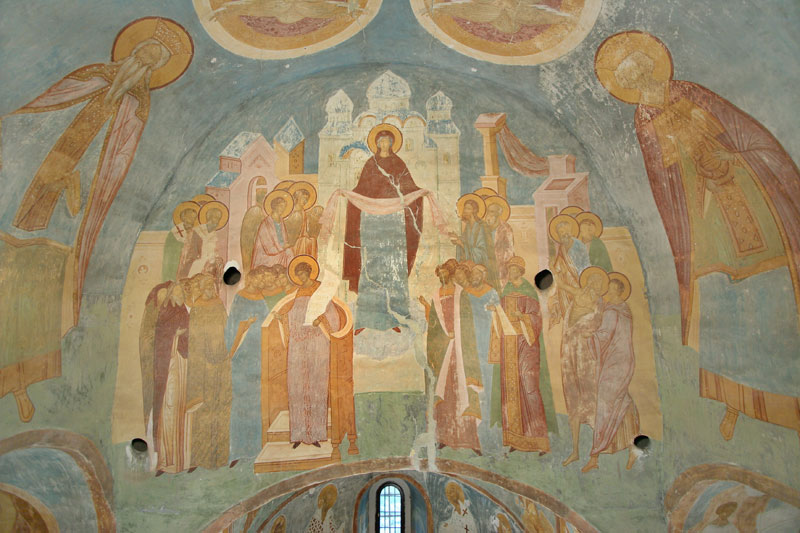
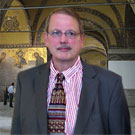
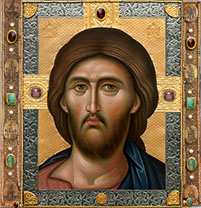 click here for icons of christ
click here for icons of christ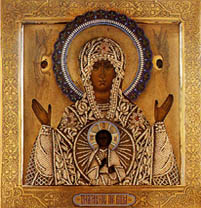 click here for icons of the theotokos
click here for icons of the theotokos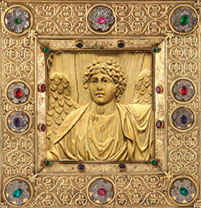 click here for icons of angels
click here for icons of angels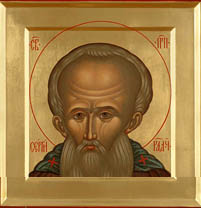 click here for icons of saints
click here for icons of saints








